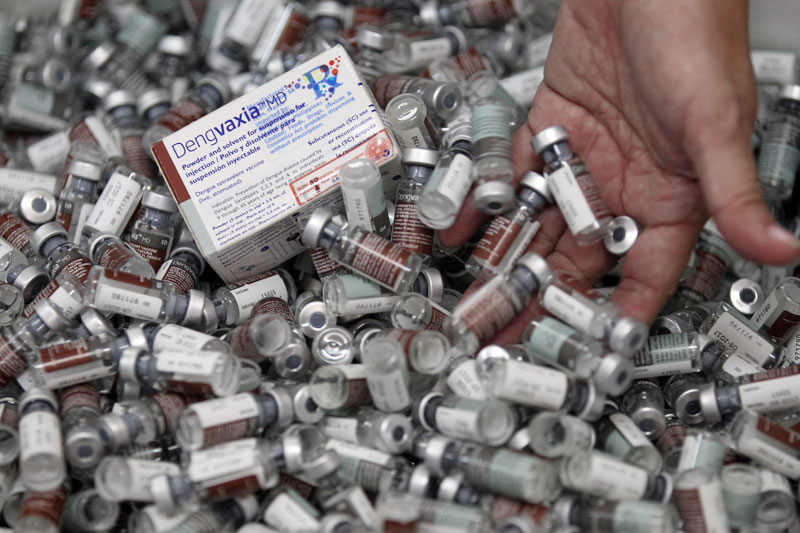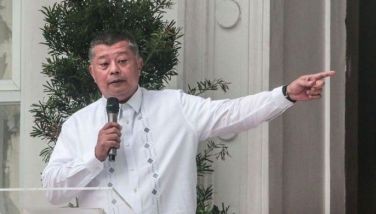DOH urged to demand P3.5-B vaccine refund

Speaking over dwIZ, Pimentel argued that the DOH should demand a full refund because Sanofi has failed to deliver on its promise regarding its product. File
MANILA, Philippines — The Department of Health (DOH) should demand refund of the entire P3.5 billion that the government paid to Sanofi Pasteur for the purchase of the Dengvaxia vaccine, Senate President Aquilino Pimentel III said yesterday.
Speaking over dwIZ, Pimentel argued that the DOH should demand a full refund because Sanofi has failed to deliver on its promise regarding its product.
Pimentel noted that Sanofi’s own admission that Dengvaxia is harmful if given to people without a history of dengue could be used against the firm in demanding refund of the full amount.
He argued that the contract between the government and Sanofi contains the promise of protecting children from possible future dengue infection. So with Sanofi’s revelation about the effects of the vaccine, the contact could already be deemed void.
“The expectation was not fulfilled so in effect it is as if there was no contract. So they should refund the full amount,” he added.
Pimentel noted that the only complication is the move of the DOH to seek a refund of only P1.2 billion, representing the unused vaccines purchased by the government from Sanofi.
Pimentel hit the DOH’s move to seek a partial refund from Sanofi, saying it is as if the DOH is more concerned about what will be more acceptable to Sanofi.
Pimentel further argued that Sanofi should not only pay P3.5 billion but a lot more to compensate the families of the children who were given Dengvaxia.
Over 800,000 public school students in Central Luzon, National Capital Region and Calabarzon region were given three doses of Dengvaxia.
After the third dose was given to the pupils earlier this year, vaccine manufacturer Sanofi Pasteur admitted that Dengvaxia could be harmful for those who have no history of dengue, as the vaccine can cause severe dengue.
Some of the children who received Dengvaxia died, while many have experienced medical complications allegedly as a result of taking vaccine.
Pimentel said that Sanofi must also put up a compensation fund to cover all the expenses incurred by affected families.
For Senate Blue Ribbon committee chairman Richard Gordon, the discussions between Sanofi and the DOH should be transparent in order to dispel any suspicions.
Gordon also said Sanofi should not only meet with the DOH but also with various health experts.
“People are already very anxious and enraged by the latest developments in this anomalous issue, with forensic examination on the exhumed bodies of several children who received Dengvaxia vaccine showing emerging patterns that led to their deaths. It may further fuel public suspicion if the meetings will not be made transparent,” he added.
The Blue Ribbon committee will conduct its fourth hearing on the Dengvaxia issue tomorrow.
“While charges in courts may already have been filed by certain groups, the duty of Congress to propose recommendations in aid of legislation, particularly on the undue haste of procuring the vaccines, remains to be in place. It is Congress’ duty to make people aware of these issues,” Gordon said.
Zero balance for Dengvaxia patients
Meanwhile, the Philippine Hospital Association (PHA) plans to hold talks with the Philippine Health Insurance Corporation (PhilHealth) for measures that could lead to “zero balance” for the private hospitalization of children who were given Dengvaxia.
PHA president Hubert Lapuz announced this during a health summit in San Fernando, Pampanga on Thursday organized by the provicial government.
Lapus said that while private hospitals also honor PhilHealth insurance, hospital bills tend to be higher for dengue patients because of different rates for doctor’s fees and other medical requirements.
Since December, the Quirino Memorial Medical Center (QMMC) has checked in at least 71 patients who received the controversial anti-dengue vaccine Dengvaxia.
In a statement yesterday, the QMMC said the hospital continues to monitor patients as well as those who were already discharged from the hospital.
The hospital has also received patients with dengue-like symptoms, but majority of them were asymptomatic or had other underlying conditions aside from dengue.
“We are one with the Department of Health in addressing the medical needs of those recipients of the dengue vaccine Dengvaxia,” the QMMC said.
According to DOH, dengue is no longer classified as a seasonal illness because its threat is now year-round.
“It’s climate change that has brought the wet in dry, and the dry in wet. I had already classified dengue as a year-round ailment when I first became health secretary, but the ailment was again reclassified as seasonal in 2010 for reasons I don’t know,” Health Secretary Francisco Duque III said. – With Romina Cabrera, Ding Cervantes
- Latest
- Trending




























